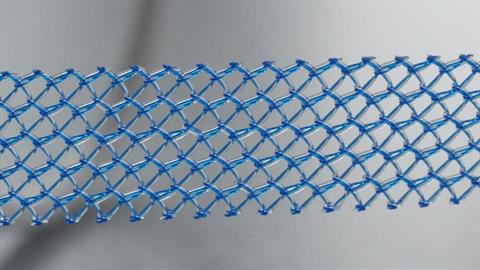Latest guidance published by the UK watchdog NICE recommends that the controversial mesh implants be restricted to research purposes only.
The decision is viewed as a highly significant step by campaigners who are calling for the use of mesh to be suspended until more long-term studies are carried out into the risks of the device.
Kath Sansom, founder of the campaign group Sling the Mesh, which has almost 5,000 members, cautiously welcomed the news.
She said: "By restricting the use of prolapse mesh to research only, it's effectively a backdoor ban. But it needs to go further to include the hundreds of women who suffer everyday from mesh used to treat stress incontinence. They need to be taken seriously."
Dr Sohier Elneil is a urogynecologist who now specialises in removing mesh - a device which is designed to be permanent. She sat on the board of NICE for 10 years and helped set the new guidance.
She said: "One of the key problems with mesh is that it can change once inside the body. It can become brittle, erode and slice through organs like the bladder.
"The recommendations by NICE are highly significant as I think they will make us all re-evaluate the way we use mesh.
She added: "The complication rate for prolapse is around 40%, whereas for stress urinary incontinence it is between 10-15%. But increasingly I expect we will see that data change."
Vaginal mesh implants are used to treat both pelvic organ prolapse, a condition where an organ such as the uterus or bladder slips out of place, and stress urinary incontinence.
Annette Power, 55, had mesh fitted in 2002 after childbirth left her with mild urinary incontinence. Ever since her operations she has suffered constant infections to the extent she is now resistant to all but one type of antibiotic.
She said: "I'm in a position where it's the devil I do, or the devil I don't - whether I leave it in or take it out. The risks of leaving it in are obviously the recurrent infections I get all the time.
"Obviously now because I'm swelling so much too, I'm having problems with my leg. I've been diagnosed with fibromyalgia. I obviously want it out but the risks of taking it out are devastating - some of the ladies have literally been left crippled, in wheelchairs, with stomas. It's literally a horrible choice that I've got to make."
Earlier this week, New Zealand became the first country to ban the use of all types of vaginal mesh out of safety fears, following Australia, which has also imposed restrictions on mesh.


.gif) Please wait
Please wait 
 امتیازات پوینت برای شما این کاربرد را دارند که میتوانید با پوینت خودتان وقتی به مقدار معینی برسد اشتراک ویژه خریداری نمایید
امتیازات پوینت برای شما این کاربرد را دارند که میتوانید با پوینت خودتان وقتی به مقدار معینی برسد اشتراک ویژه خریداری نمایید
 امتیازات لول برای شما این کاربرد را دارند که هرچه لول شما بالاتر باشد، افراد با ارسال پیام یا کارت یا افزودن شما به لیست دوستانشان امتیاز بیشتری دریافت میکنند
امتیازات لول برای شما این کاربرد را دارند که هرچه لول شما بالاتر باشد، افراد با ارسال پیام یا کارت یا افزودن شما به لیست دوستانشان امتیاز بیشتری دریافت میکنند
 امتیازات لیدر بورد برای شما این کاربرد را دارند در جدول 100 کاربر برتر سایت قرار میگیرد و در صورتی که امتیاز شما بالاتر باشد در صفحه اول سایت در جدول 10 کاربر برتر سایت نمایش داده خواهید شد
امتیازات لیدر بورد برای شما این کاربرد را دارند در جدول 100 کاربر برتر سایت قرار میگیرد و در صورتی که امتیاز شما بالاتر باشد در صفحه اول سایت در جدول 10 کاربر برتر سایت نمایش داده خواهید شد
 اعتبار گوهر که هر روز به ازای ورود به گوهردشت به شما داده میشود در صفحه اطلاعات بازی قابل تبدیل به پوینت، لول و لیدر برد است
اعتبار گوهر که هر روز به ازای ورود به گوهردشت به شما داده میشود در صفحه اطلاعات بازی قابل تبدیل به پوینت، لول و لیدر برد است



















